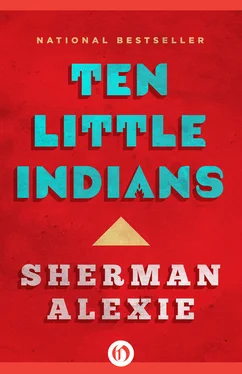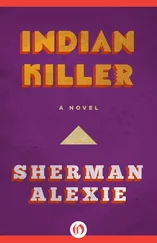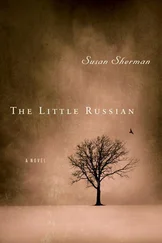Corliss didn’t want to live with a white roommate, either, no matter how interesting he or she might become. Hell, even if Emily Dickinson were resurrected and had her reclusive-hermit-unrequited-love-addict gene removed from her DNA, Corliss wouldn’t have wanted to room with her. White people, no matter how smart, were too romantic about Indians. White people looked at the Grand Canyon, Niagara Falls, the full moon, newborn babies, and Indians with the same goofy sentimentalism. Being a smart Indian, Corliss had always taken advantage of this romanticism, but that didn’t mean she wanted to share the refrigerator with it. If white folks assumed she was serene and spiritual and wise simply because she was an Indian, and thought she was special based on those mistaken assumptions, then Corliss saw no reason to contradict them. The world is a competitive place, and a poor Indian girl needs all the advantages she can get. So if George W. Bush, a man who possessed no remarkable distinctions other than being the son of a former U.S. president, could also become president, then Corliss figured she could certainly benefit from positive ethnic stereotypes and not feel any guilt about it. For five centuries, Indians were slaughtered because they were Indians, so if Corliss received a free coffee now and again from the local free-range lesbian Indiophile, who could possibly find the wrong in that? In the twenty-first century, any Indian with a decent vocabulary wielded enormous social power, but only if she was a stoic who rarely spoke. If she lived with a white person, Corliss knew she’d quickly be seen as ordinary, because she was ordinary. It’s tough to share a bathroom with an Indian and continue to romanticize her. If word got around that Corliss was ordinary, even boring, she feared she’d lose her power and magic. She knew there would come a day when white folks finally understood that Indians are every bit as relentlessly boring, selfish, and smelly as they are, and that would be a wonderful day for human rights but a terrible day for Corliss.
Corliss caught the number 7 home from the library. She wanted to read Harlan Atwater’s book on the bus, but she also wanted to keep it private. The book felt dangerous and forbidden. At her stop, she stepped off and walked toward her apartment, and then ran. She felt giddy, foolish, and strangely aroused, as if she were running home to read pornography. Once alone, Corliss sat on the floor, backed into a corner, and read Harlan Atwater’s book of poems. There were forty-five free-verse sonnets. Corliss found it interesting that an Indian of his generation wrote sonnets, while other Indians occupied Alcatraz and Wounded Knee. Most of the poems were set in and around the Spokane Indian Reservation, so Corliss wondered again why she’d never heard of this man. How many poetry lovers were among the Spokanes? Fifty, thirty, fewer than twenty? And how many Spokanes would recognize a sonnet when they saw it, let alone be able to write one? Since her public high school teachers had known how much Corliss loved poetry, and had always loved it, why hadn’t one of them handed her this book? Maybe this book could have saved her years of shame. Instead of trying to hide her poetry habit from her friends and family, and sneaking huge piles of poetry books into her room, maybe she could have proudly read a book of poems at the dinner table. She could have held that book above her head and shouted, “See, look, it’s a book of poems by another Spokane, what are you going to do about that?” Instead, she’d endured endless domestic interrogations about her bookish nature.
During one family reunion, her father sat around the living room with his three brothers. That was over twelve hundred pounds of Spokane Indian sharing a couch and a bowl of tortilla chips. Coming home from school, Corliss tried to dash across the room and make her escape, but one uncle noticed the book under her arm.
“Why you always reading?” he asked.
“I like stories,” she said. It seemed to be the safest answer. Indians loved to think of themselves as the best storytellers in the world, and maybe they were, but did they need to be so sure of it?
“She’s reading those poems again,” her father said. “She’s always reading those poems.”
She loved her father and uncles. She loved how they filled a room with their laughter and rank male bodies and endless nostalgia and quick tempers, but she hated their individual fears and collective lack of ambition. They all worked blue-collar construction jobs, not because they loved the good work or found it valuable or rewarding but because some teacher or guidance counselor once told them all they could work only blue-collar jobs. When they were young, some authority figure had told them to pick up a wrench, and so they picked up the wrench and never once considered what would happen if they picked up a pencil or a book. Her father and uncles never asked questions. How can you live a special life without constantly interrogating it? How can you live a good life without good poetry? She knew her family feared poetry, but they didn’t fear it because they were Indian. The fear of poetry was multicultural and timeless. So maybe she loved poetry precisely because so many people feared it. Maybe she wanted to frighten people with the size of her poetic love.
“I bet you’re reading one of those white books again, enit?” the first uncle asked.
“His name is Gerard Manley Hopkins,” Corliss said. “He wrote poems in the nineteenth century.”
“White people were killing Indians in the nineteenth century,” the second uncle said. “I bet this Hopkins dude was killing Indians, too.”
“I don’t think so,” Corliss said. “He was a Jesuit priest.”
Her father and uncles cursed with shock and disgust.
“He was a Catholic?” her father asked. “Oh, Corliss, those Catholics were the worst. Your grandmother still has scars on her back from when a priest and a nun whipped her in boarding school. You shouldn’t be reading that stuff. It will pollute your heart.”
“What do you think those white people can teach you, anyway?” the third uncle asked.
She wanted to say, “Everything.” She wanted to scream it. But she knew she’d be punished for her disrespect of her elders. Because she was Indian, she’d been taught to fear and hate white people. Sure, she hated all sorts of white people — the arrogant white businessmen in their wool suits, the illiterate white cheerleaders in their convertibles, the thousands of flannel-shirted rednecks who roamed the streets of Spokane — but she knew they represented the worst of whiteness. It was easy to hate white vanity and white rage and white ignorance, but what about white compassion and white genius and white poetry? Maybe it wasn’t about whiteness or redness or any other color. Corliss wasn’t naive. She knew racism, tribalism, and nationalism were encoded in human DNA, and we’d all save our own child from a burning building even if it meant a thousand strangers would die, and we’d all kill in defense of our wives, husbands, brothers, sisters, parents, and children. However, she also wanted to believe in human goodness and mortal grace. She was contradictory and young and confused and smart and unformed and ambitious. How could she tell her father and uncles she read Hopkins precisely because he was a white man and precisely because he was a Jesuit priest? Maybe Hopkins had been an Indian killer, or a supporter of Indian killers, but he’d also been a sad and lonely and lovely man who screamed to God for comfort, answers, sleep, and peace. Since Corliss rarely found comfort from her family and friends, and never found it in God, but continued to want it and never stopped asking for it, then maybe she was also a Jesuit priest who found it in poetry. How could she tell her family that she didn’t belong with them, that she was destined for something larger, that she believed she was supposed to be eccentric and powerful and great and all alone in the world? How could she tell her Indian family she sometimes felt like a white Jesuit priest? Who would ever believe such a thing? Who would ever understand how a nineteen-year-old Indian woman looked in the mirror and sometimes saw an old white man in a white collar and black robe?
Читать дальше












